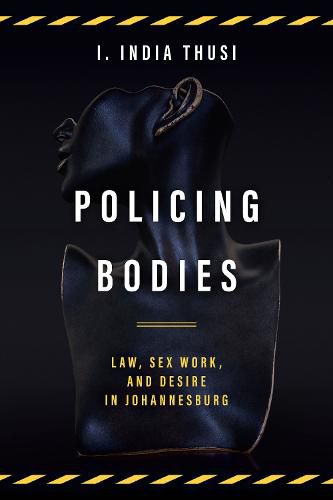Readings Newsletter
Become a Readings Member to make your shopping experience even easier.
Sign in or sign up for free!
You’re not far away from qualifying for FREE standard shipping within Australia
You’ve qualified for FREE standard shipping within Australia
The cart is loading…






Sex work occupies a legally gray space in Johannesburg, South Africa, and police attitudes towards it are inconsistent and largely unregulated. As I. India Thusi argues in Policing Bodies, this results in both room for negotiation that can benefit sex workers and also extreme precarity in which the security police officers provide can be offered and taken away at a moment’s notice. Sex work straddles the line between formal and informal. Attitudes about beauty and subjective value are manifest in formal tasks, including police activities, which are often conducted in a seemingly ad hoc manner. However, high-level organizational directives intended to regulate police obligations and duties toward sex workers also influence police action and tilt the exercise of discretion to the formal. In this liminal space, this book considers how sex work is policed and how it should be policed. Challenging discourses about sexuality and gender that inform its regulation, Thusi exposes the limitations of dominant feminist arguments regarding the legal treatment of sex work. This in-depth, historically informed ethnography illustrates the tension between enforcing a country’s laws and protecting citizens’ human rights.
$9.00 standard shipping within Australia
FREE standard shipping within Australia for orders over $100.00
Express & International shipping calculated at checkout
Sex work occupies a legally gray space in Johannesburg, South Africa, and police attitudes towards it are inconsistent and largely unregulated. As I. India Thusi argues in Policing Bodies, this results in both room for negotiation that can benefit sex workers and also extreme precarity in which the security police officers provide can be offered and taken away at a moment’s notice. Sex work straddles the line between formal and informal. Attitudes about beauty and subjective value are manifest in formal tasks, including police activities, which are often conducted in a seemingly ad hoc manner. However, high-level organizational directives intended to regulate police obligations and duties toward sex workers also influence police action and tilt the exercise of discretion to the formal. In this liminal space, this book considers how sex work is policed and how it should be policed. Challenging discourses about sexuality and gender that inform its regulation, Thusi exposes the limitations of dominant feminist arguments regarding the legal treatment of sex work. This in-depth, historically informed ethnography illustrates the tension between enforcing a country’s laws and protecting citizens’ human rights.